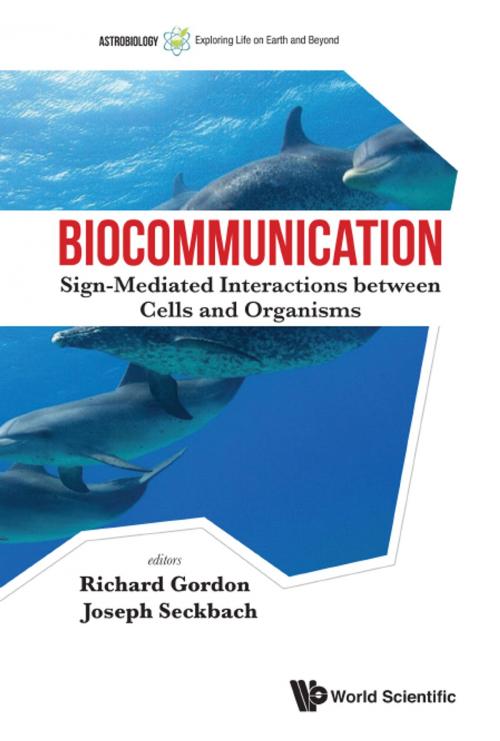Biocommunication
Sign-Mediated Interactions between Cells and Organisms
Nonfiction, Science & Nature, Nature, Plant Life, Plants, Animals, Social & Cultural Studies, Social Science| Author: | Richard Gordon, Joseph Seckbach | ISBN: | 9781786340467 |
| Publisher: | World Scientific Publishing Company | Publication: | November 1, 2016 |
| Imprint: | WSPC (EUROPE) | Language: | English |
| Author: | Richard Gordon, Joseph Seckbach |
| ISBN: | 9781786340467 |
| Publisher: | World Scientific Publishing Company |
| Publication: | November 1, 2016 |
| Imprint: | WSPC (EUROPE) |
| Language: | English |
All coordination between cells, organs, and organisms depends on successful biocommunicative processes. There are abundant cases of communication in the biological world, both within (intraspecific) and between (interspecific) single-cell and multicellular microorganisms and higher animal forms.
Split into two parts, this book first looks at the history, development and progress within the field of biocommunication. The second part presents real-life case studies and investigation into examples of biocommunication in the biological world. Among the organisms covered are bacteria, fungi, plants, terrestrial and marine animals, including bonobos, chimpanzees and dolphins, as well as a new theory of communication between parts in developing embryos (cybernetic embryos). Contributions from international experts in the field provide up-to-date research and results, while in depth analysis expands on these findings to pave the way for future discoveries. As the first comprehensive review of its kind, it is perfect for undergraduates, graduates, professionals and researchers in the field of life sciences.
Contents:
-
Theoretical Approaches:
- Molecular Biocommunication (Alexei A Sharov)
- Key Levels of Biocommunication (Guenther Witzany)
- Zoosemiotics, Typologies of Signs and Continuity Between Humans and Other Animals (Dario Martinelli)
- Communication as an Artificial Process (Massimo Negrotti)
- Cybernetic Embryo (Richard Gordon & Robert Stone)
- Superfast Evolution via Trans- and Interspecies Biocommunication (Ille C Gebeshuber and Mark O Macqueen)
- Channel Capacity and Rate Distortion in Amino Acid Networks (Boaz Tamir and Avner Priel)
- Communication Languages and Agents in Biological Systems (Subhash Kak)
-
Experimental Approaches:
- Chemical Communication (Ally R Harari and Rakefet Sharon)
- Paenibacillus Vortex — A Bacterial Guide to the Wisdom of the Crowd (Alin Finkelshtein, Alexandra Sirota-Madi, Dalit Roth, Colin J Ingham, and Eshel Ben-Jacob)
- The Crosstalk Between Plants and Their Arbuscular Mycorrhizal Symbionts: A Mycocentric View (Cristiana Sbrana, Alessandra Turrini, and Manuela Giovannetti)
- Attraction of Preferred Prey by Carnivorous Plants (Douglas W Darnowski)
- Animal Communication: Competition for Acoustic Space in Birds and Fish (Hans Slabbekoorn)
- The Contribution of the Biocommunication (BICO) to Biomedical and Tissue Engineering: A Tech Mining Study (Angela Machado Rocha, Fernando Palop, Maria Clara Melro, and Marcelo Santana Silva)
- Communication Languages and Agents in Biological Systems (Noga Gershoni-Emek, Eitan Erez Zahavi, Shani Gluska, Yulia Slobodskoy, and Eran Perlson)
- Ethical Methods of Investigation with Pan/Homo Bonobos and Chimpanzees (E Sue Rumbaugh, Itai Roffman, Elizabeth Pugh, and Duane M Rumbaugh)
- Conversing with Dolphins: The Holy Grail of Interspecies Communication? (Toni Frohoff and Elizabeth Oriel)
Readership: Undergraduates, graduates, professionals and researchers in the field of life sciences.
Key Features:
- New volume describing some of world's natural wonders of bio-communication
- The book has contributions by experts in their research fields
- This volume covers a wide range of organisms that demonstrate Bio-Communication
All coordination between cells, organs, and organisms depends on successful biocommunicative processes. There are abundant cases of communication in the biological world, both within (intraspecific) and between (interspecific) single-cell and multicellular microorganisms and higher animal forms.
Split into two parts, this book first looks at the history, development and progress within the field of biocommunication. The second part presents real-life case studies and investigation into examples of biocommunication in the biological world. Among the organisms covered are bacteria, fungi, plants, terrestrial and marine animals, including bonobos, chimpanzees and dolphins, as well as a new theory of communication between parts in developing embryos (cybernetic embryos). Contributions from international experts in the field provide up-to-date research and results, while in depth analysis expands on these findings to pave the way for future discoveries. As the first comprehensive review of its kind, it is perfect for undergraduates, graduates, professionals and researchers in the field of life sciences.
Contents:
-
Theoretical Approaches:
- Molecular Biocommunication (Alexei A Sharov)
- Key Levels of Biocommunication (Guenther Witzany)
- Zoosemiotics, Typologies of Signs and Continuity Between Humans and Other Animals (Dario Martinelli)
- Communication as an Artificial Process (Massimo Negrotti)
- Cybernetic Embryo (Richard Gordon & Robert Stone)
- Superfast Evolution via Trans- and Interspecies Biocommunication (Ille C Gebeshuber and Mark O Macqueen)
- Channel Capacity and Rate Distortion in Amino Acid Networks (Boaz Tamir and Avner Priel)
- Communication Languages and Agents in Biological Systems (Subhash Kak)
-
Experimental Approaches:
- Chemical Communication (Ally R Harari and Rakefet Sharon)
- Paenibacillus Vortex — A Bacterial Guide to the Wisdom of the Crowd (Alin Finkelshtein, Alexandra Sirota-Madi, Dalit Roth, Colin J Ingham, and Eshel Ben-Jacob)
- The Crosstalk Between Plants and Their Arbuscular Mycorrhizal Symbionts: A Mycocentric View (Cristiana Sbrana, Alessandra Turrini, and Manuela Giovannetti)
- Attraction of Preferred Prey by Carnivorous Plants (Douglas W Darnowski)
- Animal Communication: Competition for Acoustic Space in Birds and Fish (Hans Slabbekoorn)
- The Contribution of the Biocommunication (BICO) to Biomedical and Tissue Engineering: A Tech Mining Study (Angela Machado Rocha, Fernando Palop, Maria Clara Melro, and Marcelo Santana Silva)
- Communication Languages and Agents in Biological Systems (Noga Gershoni-Emek, Eitan Erez Zahavi, Shani Gluska, Yulia Slobodskoy, and Eran Perlson)
- Ethical Methods of Investigation with Pan/Homo Bonobos and Chimpanzees (E Sue Rumbaugh, Itai Roffman, Elizabeth Pugh, and Duane M Rumbaugh)
- Conversing with Dolphins: The Holy Grail of Interspecies Communication? (Toni Frohoff and Elizabeth Oriel)
Readership: Undergraduates, graduates, professionals and researchers in the field of life sciences.
Key Features:
- New volume describing some of world's natural wonders of bio-communication
- The book has contributions by experts in their research fields
- This volume covers a wide range of organisms that demonstrate Bio-Communication















